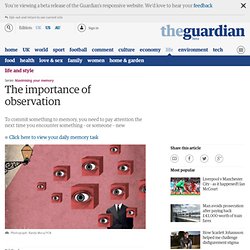

Regina Davis
Philip Zimbardo shows how people become monsters ... or heroes. The importance of observing. Never was the phrase "a job well begun, is a job half done" truer than in the case of memory.

All memories begin with what you perceive – with how you see, hear and feel the world. And for that simple reason, the first way to boost your memory is to make sure that you experience the world as vividly, clearly and meaningfully as possible. To understand how to do this, we need to appreciate that our senses are not designed to record the world, but instead to make sense of it. Where cameras take instantaneous, detailed snapshots of our surroundings, human perception takes time and is full of creativity and imagination.
To experience the world in memorable ways, we need to treat perception as an active process of recognising, probing, questioning, comparing, opining and feeling. Remembering names and faces Let's see how this works by examining the way we go about remembering names and faces at a party. . • Who do they remind me of? • What animal does this person most resemble? • Don't rush. Wardshelley_scifiSmaller.jpg (JPEG Image, 3400x1826 pixels) Physics Flash Animations. We have been increasingly using Flash animations for illustrating Physics content. This page provides access to those animations which may be of general interest. The animations will appear in a separate window.
The animations are sorted by category, and the file size of each animation is included in the listing. Also included is the minimum version of the Flash player that is required; the player is available free from The categories are: In addition, I have prepared a small tutorial in using Flash to do Physics animations. LInks to versions of these animations in other languages, other links, and license information appear towards the bottom of this page. The Animations There are 99 animations listed below. Other Languages and Links. 8 Things Everybody Ought to Know About Concentrating. “Music helps me concentrate,” Mike said to me glancing briefly over his shoulder.

Mike was in his room writing a paper for his U.S. History class. On his desk next to his computer sat crunched Red Bulls, empty Gatorade bottles, some extra pocket change and scattered pieces of paper. How white holes (might) be created. Quantum Pixel. Do-It-Yourself Biology. Personal and Historical Perspectives of Hans Bethe. Study Guides and Strategies. Hawking on the future of mankind. To mark his 70th birthday, physicist Professor Stephen Hawking answered a selection of questions from listeners to Radio 4's Today Programme.

Topics ranged from the origins of the universe to the prospects for extra terrestrial life and the impact on Einstein's theory of relativity should neutrinos be confirmed to travel faster than light. It seems clear that Professor Hawking believes we we will have to colonise space if we are to avoid catastrophe, but he is upbeat about the prospects for self-sustaining colonies on Mars and believes the human race will eventually spread out across the far reaches of the universe.
Finding intelligent life elsewhere in the universe, he says, would be the greatest scientific discovery ever, but he is not optimistic about the likely outcome. 1. Was there a "time" when there was "nothing"? The origin of the universe can be explained by the laws of physics, without any need for miracles or Divine intervention. 2. 3. 4. It is essential that we colonize space.